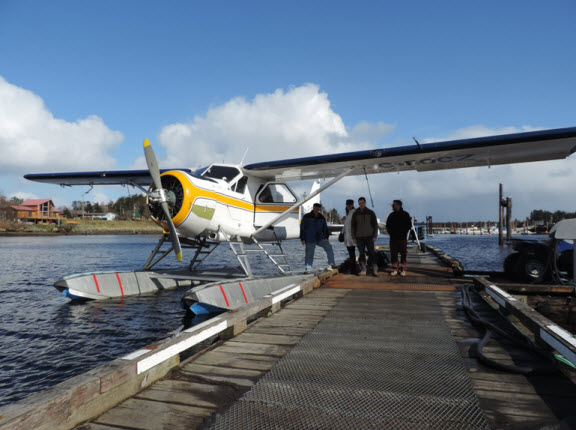Almost every month, Provincial Court Judge Herman Seidemann III and court clerks, sheriffs, probation officers and a prosecutor fly by floatplane from Prince Rupert to Masset to hold court. In Haida Gwaii they are joined by criminal and family duty counsel, lawyers provided by the Legal Services Society who fly in from Vancouver. Other lawyers arrive from Prince Rupert and elsewhere in the province. The floatplanes used are so small that it takes two flights to transport the full court party. And they are sometimes grounded by weather for up to several days, either delaying the start of the circuit or the court party’s return home.

Judge and court staff heading home after waiting a day for weather
The Provincial Court sits in Haida Gwaii for ten weeks a year, conducting criminal, family and small claims trials and family and civil case conferences, and for an additional two weeks reserved for long trials. Masset is fortunate to have a courthouse building housing the court facility, with full registry, courtroom, cells, Crown counsel and probation offices, as well as other government offices. Matters arising on northern Graham Island are dealt with in the Masset court.
During the week the court staff also drives from Masset to Queen Charlotte City to hold court in a purpose-built room in the back of the Government Agent’s offices. The Queen Charlotte list includes matters arising in Queen Charlotte, Sandspit, Tlell, Skidegate, and Moresby Island. The court schedule is adjusted to accommodate court participants travelling by ferry between Moresby and Graham Islands.
The Haida First Nation has a very active restorative justice program. A coordinator from the program is present in court in both Queen Charlotte and Masset. The RCMP is making a concerted effort to forge cooperative relations with the community and the Bands. It refers most minor matters for alternative measures (a program where, if the individual accepts responsibility for the crime and makes amends to the community, the matter is dealt with outside court). When a person performs community service as part of a sentence or alternative measures program it often includes providing traditional foods to elders, or providing First Nations art for community functions.
With almost four decades’ experience as a lawyer and judge on Haida Gwaii, Judge Seidemann is familiar with the community, its problems, and its resources. He appreciates the community’s active involvement in its court. The gallery of the courtroom is often full of observers for decisions or contentious sentencing hearings. The community newspaper reports details of the results of every circuit sitting. And once, a drug trafficker was given a conditional sentence (a jail sentence served in the community) with a curfew. When he stayed out past his curfew, it only took four minutes for a local citizen to report his breach!

